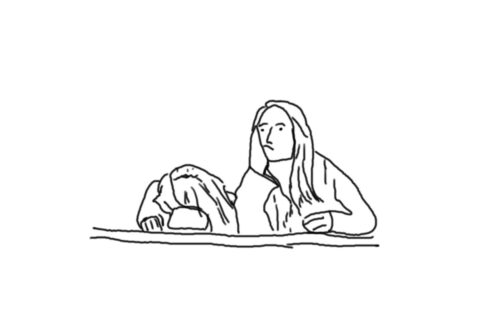There is a difference between being materialistic and being a materialist. If you are materialistic, you value material things above non-material things. By materialism I don’t mean the valuing of material things. What I mean is the view that there is nothing that exists that is immaterial. A material thing is some entity which is possible to experience. Some material things are so small you can’t see them, but it would be possible to experience them if one’s senses were adequate or if the thing in question was bigger. Of course, if you are a materialist, then you will very likely be materialistic. That’s all there is, after all.
What I mean by stink is some undesirable state of affairs. Getting a large bill from the mechanic is an undesirable outcome (for me, not the mecahanic). War is an undesirable state of affairs. Getting sick is undesirable. These things stink.
My claim is that the non-stinkyness of certain states of affairs gives us reasons to think that materialism is false. But what if materialism is true? No matter. If materialism is true, then it might still stink. Perhaps, we would still wish to have eternal souls, for their to be angels, or an almighty, loving God who provides purpose for the universe. But, if materialism is true, then there is nothing we could do about the stinkiness of materialism. “C’est la vie” we would say. The problem is that so many things of daily life don’t stink. And I think this gives us good reason to think that materialism is false.
Enough of the preliminaries. Here’s the argument:
- If materialism is true, then some state of affairs, A, lacks some feature, F.
- If A lacks F, then A stinks
- A does not stink
- Therefore, materialism is false
This is plainly a valid argument, but is it sound? There are two questionable premises. First, premise (1) might be doubted by arguing that A does have F even if materialism is true. Second, premise (2) might be doubted by suggesting that just because the state of affairs lacks some feature not available if materialism is true, it does not follow that the state of affairs is any less desirable.
Admittedly, either of these responses will work to weaken my argument. Indeed, if a materialist is completely satisfied with A lacking F, then the argument will be futile. Furthermore, materialists have a knack for working in Fs somehow. Fs ‘supervene’ on material things or are identical to material things. Some of those arguments are complex and can’t be merely sniffed at (even if they are unsuccessful in the end). So, my argument is at least open to a subjective response such as ‘so what? I can live without F.’
So what are the states of affairs I have in mind?
I’ll start with beauty. If I look at some beautiful landscape, hear some transcendent sonata, or gaze at my delightful daughter’s face, I am confronted with the idea that there is more to the world that bits and pieces of matter. Beauty points to something more than someone’s doodling on a page. I might be looking at doodles but I am looking for something more. That’s the key to beauty. Beauty always makes you long for something transcendent. This was something the romantics wanted to portray by painting mysterious glimmers of light in their landscapes as if to imply that there is something beyond the painting.
Perhaps it doesn’t for you. You are satisfied with thinking that some cellular movement just took place in your guts that made you feel squidgy and all shaky. Tears are no indication of anything more that some biological/chemical adjustment the body makes when you look at something, hear a tune, or catch a glimpse of what the romantics called the sublime. It seems to me that if there is nothing more to beauty than that, then I’d rather not have the beauty. I’d rather just be a sixties town planner and be done with it.
Next: If everything is material, then everything needs managing. Pots and pans, cars and climate – it all needs someone at the wheel. If there is one thing I learned from the recent election it is that politicians sometimes think people are like telephone exchanges – they can be reduced to a set of inputs and outputs, as predictable as any other material object. If you entice them enough with free stuff and warn them enough about having less nice things if they vote for the other guy, then they’ll obey the laws of nature and do as they’re told. But no one is doing as they are told. Now, either they got the incentives wrong or the scope of inputs is far too small.
This was the trouble with Marxism. If we are mere material, temporal objects that happen to be animate, then the whole thing should have worked like a dream. Give a man just enough to live and be useful to the machine and the man’ll be as happy as a robot after a hard days work on an assembly line. Now, either the problem is that everyone who tried applying Marx to life has messed it up or we are not only material things – there is more to the man than that. If there is more to man than his body and we try to manage people as if they are only bodies, then the ensuing state of affairs will stink. And Marxism applied always, always stinks.
On the other hand, when you don’t try to manage every last movement of men and women, they invent telephones, learn how to survive in nearly every conceivable climate, write incredible poems, give sacrificially to one another, and fly to the moon. None of these things stink because none of them treat people like telephone exchanges.
Another one: If materialism is true, then no one can send thoughts to anyone else let alone pray. If materialism is true, then there is nothing–no thing–that is spiritual. Wellness cannot be anything to do with ‘spirit’ no matter how cool that sounds in a Yoga class. You can no more send a thought to anyone than you can send an email with a quill. And there is no such thing as prayer. Prayer is speaking to someone who is not material. If there are no non-material things let alone non-material people, then prayer is just talking to an imaginary friend.
Now, I don’t have much to say about sending thoughts to someone apart from the obvious fact that if thoughts are not material, then it would be possible for them to travel. But the futile nature of prayer, if materialism is true, should give us rise to be suspicious of materialism. Prayer does not stink precisely because materialism is false. You really are speaking to someone when you cry out from your soul to God. And he really hears you.
If materialism is true, then love is like having a snotty nose. If all that exists is material, then love is only material. Something happens inside our bodies as a result of being near a particular person. But then there is not much difference between love and catching a common cold – they are merely bodily processes. Nothing more, nothing less.
But love like that stinks. The difference between catching a cold and loving my wife is more than the operation of different bodily processes. And if love is only the movement of cells, then love stinks. But it plainly doesn’t.
Finally, if materialism is true, then convictions are like corrupot politicians – available to the highest bidder. In fact, the conviction that materialism is true is merely a result of inputs. Many have noticed that if what we think is true is causally related only to our physical histories, then thinking that materialism is true is causally related to our physical histories. But truth is something that transcends physical histories since physical histories are contingent, they could have been otherwise. Necessary truths are truths that could not have been otherwise. What’s so stinky about this is that I would have no reason to trust anything I believe. If it all could have been otherwise if physical history had been different, then there is no reason to trust what I think. But there is reason to truth what I think (at least some of what I think!). Therefore, materialism is false.
Okay, there are probably more things I could come up with but that’s enough to get the idea. I have argued that some day to day experiences of the world would stink if materialism was true (because they would lack some non-stinky feature). Those experiences don’t stink. Therefore, materialism is false. The argument is very weak since it depends entirely on what I would find undesirable. So it is open to the objector to say that he finds none of the consequences of materialism to stink that he is happy without God, angels, souls, abstract objects, or any other transcendent reality. But perhaps, you might be disturbed to find out just how little there is to art, politics, thoughts, and reasoning. Perhaps you think there is a glimmer of something more about reality. I would urge you to allow your suspicions to grow.
[DISCLAIMER: This argument is weak. It is the kind of argument that has some power but mainly because of some subjective factor, in this case my personal preferences. You are free to dismiss it if your preferences are at odds with mine. However, such an argument can give rise to doubts. If you are a materialist, some of what I suggest does follow from materialism. You just have to decide whether you like what follows enough to carry on assuming materialism. There are much better arguments against materialism. And those arguments show that materialism doesn’t just lead to states of affairs that are undesirable, but that materialism cannot account for objective features of the world we inhabit.]



